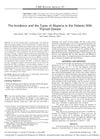Drug-Induced Diffuse Hair Loss in Females: An Observational Study
January 2014
in “
Astrocyte
”
diffuse hair loss DHL antihypertensives hormones NSAIDs antidiabetics oral contraceptives antitubercular drugs tricyclic antidepressants vitamin supplements thyroxine amlodipine hair loss blood pressure medications nonsteroidal anti-inflammatory drugs diabetes medications birth control pills antidepressants vitamins Synthroid Norvasc
TLDR Some drugs may cause hair loss in women.
In an observational study from 2014, 255 females with diffuse hair loss (DHL) were evaluated for a history of drug intake that could interfere with the hair cycle. Out of these, 67 patients (26.2%) reported a history of drug intake, and a detailed history was obtained from 57 patients (22.3%) who experienced DHL onset or worsening after starting medication. The average duration of DHL was 9.8 months, and the mean duration of drug intake was 49.1 months. The study identified 100 suspected drugs, with antihypertensives (23%) being the most common, followed by hormones (12%), NSAIDs (11%), antidiabetics (8%), oral contraceptives (6%), antitubercular drugs (5%), tricyclic antidepressants (4%), and vitamin supplements (4%). Thyroxine was the most implicated individual drug (10%), followed by amlodipine (5%), and several others at 3%. The study concluded that drugs are a potential cause of DHL in females and emphasized the importance of taking a detailed drug intake history in affected patients.













